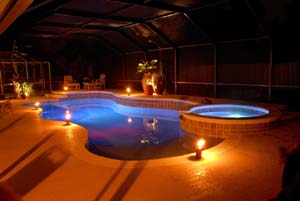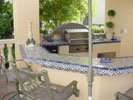Pool Chemicals
When you are asked “Is your pool chemically balanced?”, what we are referring to is the: pH, Total Alkalinity, and Calcium Hardness. In Florida, you will probably not change the water in your pool until you need to re-surface the interior (10-12 years), so pretty much everything can affect your pool waters chemical balance.
Water seeks out minerals to balance itself giving it a scaling and corrosive qualities. Corrosive water is water that is under saturated with minerals. In order to saturate itself, it will dissolve everything it can that it comes in contact with, including your pools interior finish, & grout. Over-saturated water is carrying too many minerals. In order for it to balance itself, it leaves a scale residue on your pools interior. To keep your pools water right where it needs to be chemically, you will need to test for pH, alkalinity, and calcium hardness on a weekly or biweekly basis.
If you’ve ever had a fish tank, you may be familiar with pH- a measure of hydrogen ion concentration. Basically, pH tells you whether your pool is acidic or alkaline. It is measured on a scale of 0-14 with 7 being neutral, 0<7.2 is acidic, and 7.8<14 is basic or alkaline. You want your pH to read somewhere between 7.2 and 7.8. Pool Captain provides a chemical test kit to each of our customers. If you need to increase the pH you would add ALKALINITY INCREASER (sodium bicarbonate). If you need to decrease your pH you would add ACID (MURIATIC ACID).
Alkalinity is a measurement in ppm (parts per million) of waters capacity to neutralize acids. It is made up of all of the carbonates and bicarbonates in the water. Total alkalinity is the ability of the pools water to resist changes in the pH. For a gunite pool your Total Alkalinity should be between 80-120 ppm. For a fiberglass pool it can be higher between 125-170 ppm.
Calcium hardness is a combination of carbonate ions and calcium, and is commonly referred to when describing water as being “hard” or “soft”. Hard water has high levels of calcium in the water leading to (calcium carbonate) scale. Soft water will seek out calcium from whatever it can. This will eventually corrode the surface of a gunite pool, the grout between the tile, and any metal surfaces or equipment. Your pools calcium hardness levels should be between 200-400 ppm. To increase the calcium content of your water, you can add CALCIUM INCREASER. To decrease the calcium hardness you can drain some water from your pool and replace it with fresh new water, or you can purchase a chelating agent which will bond with the calcium.
Here is a great link to another article that will help you in balancing your pool. Maintaining Your Swiming Pool










